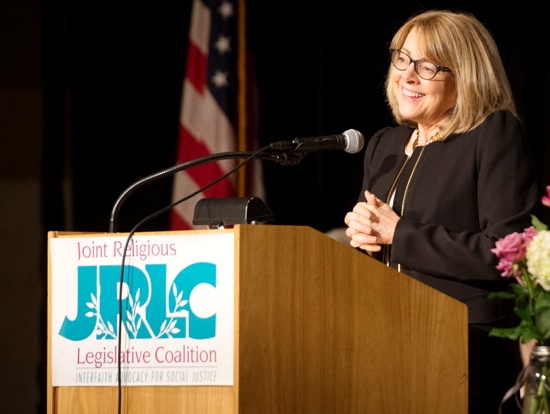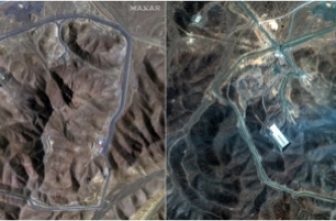
The core values of the faith should shape all of Catholics’ decisions — including those involving politics, said Joan Rosenhauer, executive vice president of Catholic Relief Services who spoke March 10 at the Joint Religious Legislative Coalition’s (JRLC) annual Day on the Hill at the RiverCentre in St. Paul.
But before Catholics bring their values to public debate, they need to understand the faith tradition’s teaching and direction, study the issues from different sides and pray about how to act, Rosenhauer told the interfaith audience.
About 600 people from around the state — many of them clergy and lay Christians, Jews and Muslims — attended the event that involved morning talks and a briefing on four social justice issues of common concern to their different faith traditions. Following were afternoon visits with legislators to discuss the issues.
Day on the Hill attendees from Catholic and other backgrounds talked about the day and their hope for passage of legislation helping the poor and vulnerable.
It’s critical for the faithful to “bring our values lifting up the dignity of every person, the preferential option for the poor, with particular concern for the poor who are struggling, and the common good to be a part of decision making in our political life,” Rosenhauer said.
The major faith traditions all have at their core the message we believe should shape how we run society, she said. Values that are part of Catholic identity and shared by other traditions include the sacredness of human life, the common good and principle of solidarity, a preferential option for the poor and vulnerable, and stewardship of the environment, Rosenhauer said.
These values that form the foundation of decisions for people of faith working together to affect public policy are the true intersection of faith and political life, she said. Current resistance over bringing faith into public life doesn’t reflect the fact that it’s neither new nor unusual — and it doesn’t violate the constitutional separation of church and state, she said.
“The idea that what we are bringing are the core values of what we share as human beings to decision making and we are not trying to make state a reflection of any one tradition,” Rosenhauer said. “We do want to make sure that we have a chance to raise our voices in light of what we believe. And that’s a critical part of our democracy.”
Becoming a faithful citizen does require work, she said. “Faithful citizenship is bringing our values to the debate after examining our consciences and determining what our faith calls us to in light of really understanding the issues and doing that with civility.”
In their legislative visits, Day on the Hill attendees focused on issues of affordable child care, human trafficking, economic assistance for low-income parents and children, and restoring the right to vote for those on parole or probation.
“The issues the JRLC works in common with Catholics on, issues we can all agree are important to build this civilization of love, which [Pope St. John Paul II] and Pope Francis have asked us to be involved in,” said Bishop Andrew Cozzens, who attended the event. “It’s very important that we join with other likeminded religious people on issues we can agree with because together we can incrementally make our civilization closer to what the Gospel asks.”
Catholics joined with other people across the denominational and religious lines to advocate their support in matters and address some of the needs of the most vulnerable in our society, said Jason Adkins, executive director of the Minnesota Catholic Conference, which sponsors the JRLC along with the Minnesota Council of Churches, the Jewish Community Relations Council and the Islamic Center of Minnesota.
Founded in 1971 as the first interfaith public-interest lobby group in the United States, the JRLC is the largest and most inclusive interfaith public interest group in Minnesota.
Patrice Eveslage, a member of Mary Mother of the Church in Burnsville, was one of nine from her legislative district who visited their representatives after the morning program. “These are all very important issues to talk about,” she said of the four key issues.
Eveslage has attended Day on the Hill for four years and believes she is answering a call to participate and talk to policy makers about what’s important to the state.
Bob Rubinyi, who has attended Day on the Hill for 12 years, said he appreciated Rosenhauer’s discussion of the common values of different traditions.
“It’s important that the faith community come together; they can try to represent the poor and the need for justice,” said Rubinyi, a JRLC board member from the Jewish Community Relations Council. “The underrepresented often don’t have resources to affect policy. It’s important for the faith community to be that voice.”
Ben Caduff of St. Dominic in Northfield said the morning talks offered hope that he and other attendees from his legislative district addressed while visiting legislators.
“It just gives you hope to keep on doing this work for social justice and meeting with your legislators because you can have a real impact in peoples’ lives,” said Caduff, who coordinates the young adult program at the Basilica of St. Mary in Minneapolis.
Caduff, who has attended Day on the Hill for five years, said he has been inspired to see people come together to live out their respective faiths in a concrete way.
“It makes you very aware that you’re not alone in your concern for justice and for living out your faith and the Church’s social teaching,” he said.




